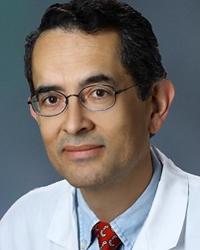Research Lab Results
-
Jean Kim Lab
The Jean Kim Laboratory performs translational research in the area of chronic rhinosinusitis, with a niche interest in the pathogenesis of hyperplastic nasal polyposis. Studies encompass clinical research to basic wet laboratory research in studying the underlying immune and autoimmune mediated mechanism of polyp growth and perpetuation of disease. Human cell and tissue culture models are used. Techniques in the laboratory include cell and tissue culture, real time PCR, immunoblot, ELISA, flow cytometry, immunohistochemistry, electron microscopy, gene array analysis, and other molecular approaches including genetic knockdowns. Approaches used in Dr. Kim’s clinical study designs include prospective and retrospective analysis of patient outcomes and clinical biomarkers, as wells controlled clinical trials.
-
The Cihakova Lab
The Cihakova research laboratory is an immunology laboratory dedicated to the investigation of autoimmune diseases. Our most active research is focused on myocarditis and dilated cardiomyopathy. We expanded our interest in inflammatory heart diseases to include the study of immune mechanisms driving pericarditis and myocardial infarction. In addition, we are interested in the pathogenesis of a broad range of autoimmune diseases such as, Sjogren's syndrome, congenital complete heart block, and APECED (autoimmune polyendocrinopathy-candidiasis-ectodermal dystrophy). Through several collaborative projects we also investigate rheumatoid arthritis and the immune components of schizophrenia. -
Diane Griffin Lab
Research in the Diane Griffin Lab focuses on the viral, cellular and immunologic determinants of diseases caused by alphaviruses and the measles virus. Our current studies aim to understand the immune-system mechanisms behind viral clearance and disease enhancement. Our team is also working to understand the pathogenesis of the measles virus, with a focus on developing new vaccines and learning how the virus induces immunosuppression.
-
Douglas Ball Lab
The Douglas Ball Lab conducts clinical trials and pre-clinical laboratory studies of thyroid cancer. Our clinical trials, performed in collaboration with research staff in the upper aero-digestive group in the Sidney Kimmel Comprehensive Cancer Center, have included protocols for advanced radioiodine-refractory differentiated thyroid cancer and medullary thyroid cancer. Our pre-clinical research, conducted with Dr. Nelkin, Dr. Agrawal and other Kimmel Cancer Center researchers, includes pathogenesis and mechanisms of treatment resistance in medullary thyroid cancer, and pathogenesis and immune-directed therapy of anaplastic thyroid cancer.
-
David Thomas Lab
The David Thomas Lab oversees clinical research projects that aim to understand the natural history and pathogenesis of hepatitis C virus infection. A special area of clinical and research focus is liver disease in HIV-infected people.
-
William G. Nelson Laboratory
Normal and neoplastic cells respond to genome integrity threats in a variety of different ways. Furthermore, the nature of these responses are critical both for cancer pathogenesis and for cancer treatment. DNA damaging agents activate several signal transduction pathways in damaged cells which trigger cell fate decisions such as proliferation, genomic repair, differentiation, and cell death. For normal cells, failure of a DNA damaging agent (i.e., a carcinogen) to activate processes culminating in DNA repair or in cell death might promote neoplastic transformation. For cancer cells, failure of a DNA damaging agent (i.e., an antineoplastic drug) to promote differentiation or cell death might undermine cancer treatment. Our laboratory has discovered the most common known somatic genome alteration in human prostatic carcinoma cells. The DNA lesion, hypermethylation of deoxycytidine nucleotides in the promoter of a carcinogen-defense enzyme gene, appears to result in inactivation of the gene and a resultant increased vulnerability of prostatic cells to carcinogens. Studies underway in the laboratory have been directed at characterizing the genomic abnormality further, and at developing methods to restore expression of epigenetically silenced genes and/or to augment expression of other carcinogen-defense enzymes in prostate cells as prostate cancer prevention strategies. Another major interest pursued in the laboratory is the role of chronic or recurrent inflammation as a cause of prostate cancer. Genetic studies of familial prostate cancer have identified defects in genes regulating host inflammatory responses to infections. A newly described prostate lesion, proliferative inflammatory atrophy (PIA), appears to be an early prostate cancer precursor. Current experimental approaches feature induction of chronic prostate inflammation in laboratory mice and rats, and monitoring the consequences on the development of PIA and prostate cancer.
-
Laboratory of Airway Immunity
We are interested in understanding how innate immune responses regulate lung health. Innate immunity involves ancient, and well-conserved mediators and their actions regulate the balance between homeostasis and pathogenesis. In the lungs, innate immunity play a critical role in response to environmental exposures such as allergen and ambient particulate matter. My lab focuses on how these exposures can promote aberrant mucosal responses that can drive the development of diseases like asthma.
-
Nicola Heller Lab
Research in the Nicola Heller Lab focuses on the immunobiology of macrophages. Our team explores how these cells impact diseases with an inflammatory element, such as cancer, cardiovascular disease and obesity. Using a variety of techniques, including molecular and cellular biology, biochemistry, mouse models and more, we study the role of IL-4/IL-13 signaling in asthma and allergic disease, as well as the role of alternatively activated macrophages (AAM) in the pathogenesis of allergic inflammation. Currently, we are researching the links between asthma and obesity, with a focus on the roles of gender and race. -
Neuroimmunopathology Lab
The research activities of the Neuroimmunopathology Laboratory focus on studies of immunological and molecular mechanisms involved in the pathogenesis of neurological disorders. Our main areas of research include studies of neurological complications of HIV infection and AIDS, multiple sclerosis, transverse myelitis, autism and epilepsy. We seek to explore and identify immunopathological mechanisms associated with neurological disease that may be the target of potential therapeutic interventions. The laboratory collaborates with other researchers and laboratories at Johns Hopkins and other institutions in projects related with studies of the interaction between the immune and central nervous systems in pathological processes leading to neurological dysfunction.
-
The Hackam Lab for Pediatric Surgical, Translational and Regenerative Medicine
David Hackam’s laboratory focuses on necrotizing enterocolitis (NEC), a devastating disease of premature infants and the leading cause of death and disability from gastrointestinal disease in newborns. The disease strikes acutely and without warning, causing sudden death of the small and large intestines. In severe cases, tiny patients with the disease are either dying or dead from overwhelming sepsis within 24 hours. Surgical treatment to remove most of the affected gut results in lifelong short gut (short bowel) syndrome. The Hackam Lab has identified a critical role for the innate immune receptor toll-like receptor 4 (TLR4) in the pathogenesis of necrotizing enterocolitis. The lab has shown that TLR4 regulates the development of the disease by tipping the balance between injury and repair in the stressed intestine of the premature infant. Developing an Artificial Intestine A key goal is to create, in the laboratory, new intestines made from patients’ own cells, which can then be implanted into the patient to restore normal digestive function. This innovative design could transform child development and quality of life in necrotizing enterocolitis survivors without the risks of conventional donor transplant.

